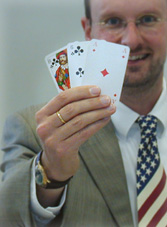
With a number of intercultural stories and some music left from my Christmas trip to New Braunfels, Texas I somehow felt forced to produce a second show about the German Belt in Texas. The emphasis is on the reasons why Germans have emigrated to Texas and the reputation of Germans in the USA.
absolutely unlimited
People did not only emigrate in the 19th century as in our example in show 49, but also today many leave their homes and friends in the hope of better opportunities in the United States. Günther and Cornelia Dirks tell us how they went to Texas to put into practice their dream of opening a German restaurant called “The Friesenhaus” and why their philosophy of “Just do whatever you Dreams are” did not work for them back in Germany.
absolutely claustrophobic
Leaving Berlin during the Cold War, Klaus joined first the Canadian, later on the American Army to feel the freedom to move around. His wife Edith, still cooking and speaking German better than English just felt that Berlin with the wall around it was too claustrophobic, or “eng” as she likes to say.
absolutely unpronounceable
Laurent tells us how words like “Schleswig-Holstein-Schnitzel”, “Oma’s Haus”, or “Schlitterbahn” belong to the daily vobabulary of Texans and asks the owners of the restaurant if the Americans really like the Germans so much, that they use German stereotypes for their business.
absolutely un-German
Finally, there are, of course, also people who immigrate to Germany because they searched for a new challenge or just liked the idea of living there. Our studio guest Jean Lennox came to Germany in the 70ies and developed what she calls “a-long-time-love-and-hate-relationship”, staying somehow British, but also absorbing some of the best German characteristics. Will she go back when she retires?
The next show will be coming to you on 7 March from Anne Fox in Denmark.
So long…stay tuned!
Host of this show: Dr. Laurent Borgmann
Editor: Peter Kron





 In this show we are going to look into which parts of our culture we have to re-think or even leave behind when we get married. We have entertaining stories from Lebanon, the United States, Hungary, and Spain and even from our own lives.
In this show we are going to look into which parts of our culture we have to re-think or even leave behind when we get married. We have entertaining stories from Lebanon, the United States, Hungary, and Spain and even from our own lives.